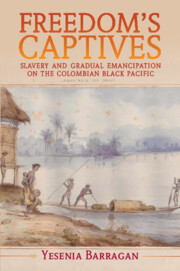Book contents
- Freedom’s Captives
- Afro-Latin America
- Freedom’s Captives
- Copyright page
- Dedication
- Epigraph
- Contents
- Figures
- Tables
- Acknowledgments
- Introduction
- Part I The Social Universe of the Colombian Black Pacific
- Part II The Time of Gradual Emancipation Rule
- Part III Final Abolition and the Afterlife of Gradual Emancipation
- 6 Final Abolition and the Problem of Black Autonomy
- Epilogue
- Bibliography
- Index
6 - Final Abolition and the Problem of Black Autonomy
from Part III - Final Abolition and the Afterlife of Gradual Emancipation
Published online by Cambridge University Press: 18 June 2021
- Freedom’s Captives
- Afro-Latin America
- Freedom’s Captives
- Copyright page
- Dedication
- Epigraph
- Contents
- Figures
- Tables
- Acknowledgments
- Introduction
- Part I The Social Universe of the Colombian Black Pacific
- Part II The Time of Gradual Emancipation Rule
- Part III Final Abolition and the Afterlife of Gradual Emancipation
- 6 Final Abolition and the Problem of Black Autonomy
- Epilogue
- Bibliography
- Index
Summary
After surveying how a capitalist culture and corresponding associationism expanded throughout the Pacific lowlands in the 1840s, Chapter 6 chronicles a final abolitionist movement in Colombia leading in the early 1850s to a final abolition law that compensated slaveholders. This chapter offers the first in-depth study of compensation in Colombia and Chocó specifically, a befuddling bureaucratic process for both lowland officials and ex-masters. Notwithstanding administrative challenges, former slaveholders in the lowlands circulated the government-sponsored “manumission bills” well into the 1850s, whether to pay off their private debts or fortify their descendants’ wealth via their last will and testament. These haunting records lay bare the immediate financial afterlife of slavery in the Colombian Pacific, revealing how enslaved lowlanders’ “paper bodies” continued to fuel the postslavery economy. Finally, the chapter examines the lowlands’ contending postslavery racial geographies and economies into the 1850s. Frontier authorities and former slaveholders sought to retain gradual emancipation rule and devised new methods of social control but had little success implementing such measures in the historically autonomous Colombian Pacific. On the coastal frontier, a social universe daily managed by independent black bogas and gold miners, the principal challenge for white rulers after emancipation was black autonomy.
Keywords
- Type
- Chapter
- Information
- Freedom's CaptivesSlavery and Gradual Emancipation on the Colombian Black Pacific, pp. 233 - 278Publisher: Cambridge University PressPrint publication year: 2021

